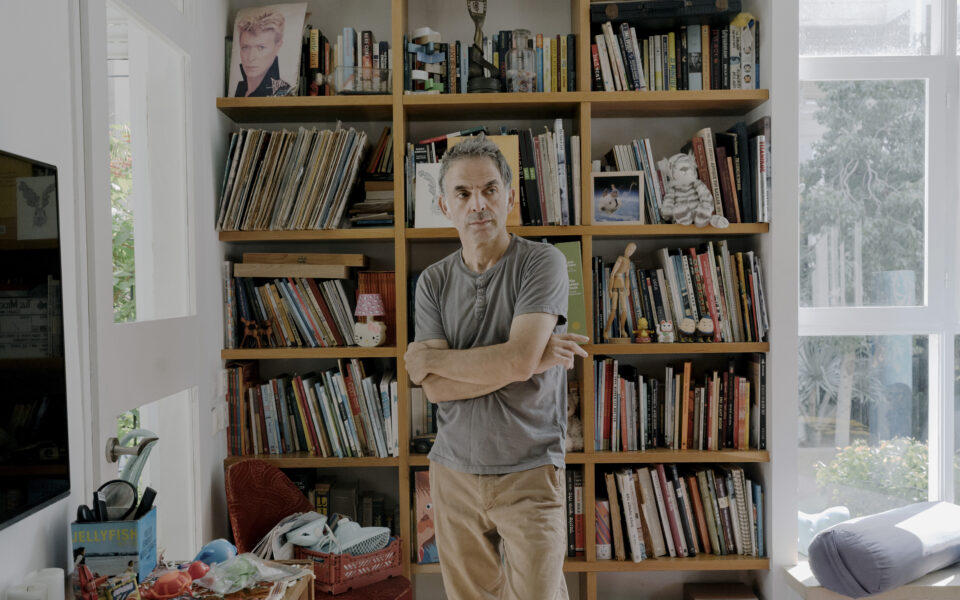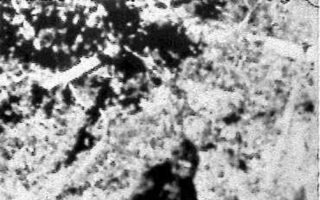‘I feel a human deterioration’

When I spoke with the writer Etgar Keret at home in Tel Aviv earlier this week, he was in anguish. Keret is one of Israel’s most beloved contemporary authors, whose books include “Suddenly, a Knock on the Door” and “The Seven Good Years.” He primarily writes short stories that are whimsical, surrealist and darkly funny, and that make meaning from life’s smallest, most unremarkable interactions.
But this moment – and the pain it has brought Israelis and Palestinians – is one that Keret is struggling to comprehend. A self-described “left-wing, liberal peace activist,” he has been grasping for clarity by reflecting on his parents’ experiences as Holocaust survivors. But as the war enters its fourth week, and civilian casualties mount in Gaza, words are often failing him. “When I see children running in fear and crying, I don’t care about anything,” he told me. “I just want this to not happen.”
This interview has been edited and condensed for length and clarity.
Q: I know you spent this morning reading to the survivors of a kibbutz that was attacked by Hamas on Oct 7. Can you tell me about it?
A: My wife and I, we had a reading for children. It was a mixed group – some people who were evacuated from the kibbutzim that were massacred and burned, and other kids that were from the northern front, brought there as a precaution because they were afraid that there would be war with Hezbollah. And it took about 20 seconds to know which was which.
We ask the kids in the beginning: Imagine a tree, your fantasy tree. And they are 4 or 5 years old, and one says, “Ice cream tree.” And the other says, “Video game tree.” And the third one says, “Burned tree.” So you really know who came from where. And when I come out of these events – really, not when I come out of these events, but 24/7 – I feel so much less than a human being.
Q: Tell me what that means.
A: I think that in our souls, or our minds, or whatever you call it, there is something very complex, some ability to contain ambiguity, not to be swept with only one emotion. To be able to inhale the complexity of existing. And I must say that this became a challenge. It’s not as nonchalant as it used to be.
Q: I don’t know what it would be like to sit in front of children who have lived through what they’ve lived through. What did you tell them?
A: Look, it’s funny because I did another event for grown-ups, and it was mostly for elderly people. And I said: “Any more questions? No? No. OK, thank you. Goodbye.” And they were elderly, most of them, so they got up slowly. And some were already walking out, and then this woman said: “Hey! It was wonderful, the reading, but you didn’t instruct us what we’re supposed to do now!” And I saw that all the people came back and sat down and were sitting and looking at me. And I basically found myself sitting there and talking to them about all the stuff that my parents would talk about when I was a child.
Both of my parents are Holocaust survivors. So the first thing I said to these people was that when I was a kid, I came back from school and my dad asked me, “What did they teach you in school today?” And I was very proud, and I said to my dad, “Today, they taught me the lesson of the Holocaust, which was that Jews should have a safe haven and never be threatened.” And my father looked at me, and he said, “Don’t you think, if something so painful, so, I don’t know, difficult to get, happens – don’t you think that maybe there could be more than one lesson?”
And I think that my feeling, and what I say to people, is: Nobody’s going to tell you something and you’re going to get it. You’re not going to get it.
Q: You have written and collaborated with Palestinians in the past. Have you talked to any of them?
A: First of all, I didn’t speak with the Palestinian intellectuals. I just spoke to people I know. But to be honest, it wasn’t a very deep or meaningful conversation. It was basically just noting that we care for each other and that we are not happy about what happened and what is about to happen. They were calls to say, you know, the world, it changed, but we stay the same. I mean, not the same, but we refuse to choose a side. We refuse to ignore half of the picture.
I know I’m talking a lot, but may I tell you a story?
Q: Please.
A: I have a neighbor, a guy who lives down the street, and he does those Lego robotics classes for children. And when this all started, he called me, and I feel that he’s in a state, you know? And I said to him, “What happened?” And he said to me that he had this group of children who were Palestinian with Israeli citizenship, living in Israel. And they’ve been working together for two years, and they were his favorite team. And the kids would come to his place, and he would visit them. And they were very, very, very close.
He said, “I just opened the internet, and I saw that they are all sharing this Hamas video, and they do a thumbs up for Hamas.” And the guy says, “I know those kids. They’re good kids.” And then he says, “Maybe they don’t get it.” And then he says, “Maybe I don’t get it.” And there’s this silence, and I know that he called me because he thinks I’m going to say something smart. I don’t know, because I’m a writer. And it felt like a year. And then I said to him: “Man, I have to run. I have to do something.” But I didn’t have to do anything. I just couldn’t stand it anymore.
Q: It feels like a lot is being asked of you in this moment.
A: First of all, I think nobody asked me for anything. And I’m not doing a lot. I think what I’m mostly doing is, I’m keeping myself busy and trying to convince myself that there is some use for my existence. It’s really as basic as that.
What happened in Israel on Oct 7 – the perspective that people like me got was very weird, because you see people in the TV studio, while others are calling them saying: “Please send help. They killed my daughter. They’re burning the house down. I’m burning. I’m dying.” You were trapped in the intimacy of inhuman acts, and you felt helpless in this situation. There was nothing you could do. And I’m saying that I think that any person who’s sensitive or even insensitive – I think that this entire nation is going through PTSD. We’ve been through something. I think that I had to deal with my helplessness, with my inability to save those people.
Q: So you felt a lot of impotence.
A: I felt all these dumb things. Like, I don’t drive. I’m 56, and I don’t drive. And suddenly that day I thought: If I had a driving license, I could go to the south. Maybe I could save somebody. That was my thought. Like, you dumb [expletive]. I don’t even know how to put a bandage on somebody who’s hurt.
I think I always felt that there was something about my incompetence, that it was kind of my mystique. Like, here is a guy who has lived more than half his life and can’t scramble an egg. I thought it was cute. But, suddenly, it didn’t feel cute. And I think that this feeling was only broken when I saw other people collapsing. And what I feel that maybe I have to give is to be some kind of presenter of failed humanity. To say: I’m confused.
Q: Can you explain to me how you feel about the invocation of the Holocaust at this time? Because I’ve heard what happened on Oct 7 compared to the Holocaust. And I’m wondering how that sits with you, as the child of Holocaust survivors.
A: In some sense I feel that my parents trained me all my life for this moment. And I think that the most important thing that I got from my parents was saying that when there are big incidents, there are big narratives. And those big narratives would say: You have a role. You are now a victim. You are now a hero. And they said, “Don’t believe those roles.”
Q: What is the narrative that’s being written now?
A: Well, I think that we are living in a very binary world, with social media and all the vaccinators, anti-vaccinators, Trump, Democrats. So I think that in this sense, there are many super strong sentiments right now.
I wrote an op-ed for The New York Times a long time ago about how I don’t like the terms “pro-Israel” and “pro-Palestinian.” Because when you speak to somebody and he says that he’s pro-Israel or pro-Palestinian, then it doesn’t matter what argument you’re going to give, he’s going to stay in the same opinion.
It’s like, being “pro-Israeli,” are you pro-children dying in Gaza from bombing? The idea is that reality is complex, and, for me, the primal responsibility is a human one.
And when I see people watching the horrible tragedy that is happening here as if it were a Super Bowl of victimhood, in which you support one team and really don’t care about the other, empathy becomes very, very selective. You see only some pain. You don’t want to see other pain. I think that in situations like this, it’s a reflex to go to something that you know. But it’s a bad reflex when the world changes around you.
Q: I’m seeing it here in the United States. Certainly, you’re seeing it there – how the words we use to describe what we’re experiencing are so charged. And as a writer, words are central to what you do. And I’m wondering how you’re choosing your words?
A: Well, I didn’t write anything in the past two weeks. I write these iPhone notes for myself, mostly to digest the things that I saw or heard about. But I think that the most attacked posts on the internet are those of people saying, “Oh, my god, I see people dying in Israel and I see people dying in Palestine, and it breaks my heart.” If you put up a post like that, they will rip you to pieces from both sides. And I’m saying that, in this sense, I do feel some kind of deterioration, a human deterioration.
Q: But there is this real wrestling with what exactly should be said at this moment. I just had an Arab friend, who is not Palestinian, tell me that a Jewish work colleague asked her to disavow Hamas. And my Arab friend then asked that work colleague to condemn the killing of civilians in Gaza. They got into this entire discussion. And it really made me think about what we are asking of each other in this moment.
A: That’s crazy. This idea of people saying: Condemn this, condemn that. I don’t want anybody to condemn anything. I say, be human. You see somebody in pain, try to see that pain. Later, there’s enough time to figure out whose fault it is. I speak to people, also in Israel, who say, “After what we’ve been through, after I lost my sister, I don’t care how many people die in Gaza.” And I say to people: When you do that, you’re hurting yourself. You’re hurting yourself. You are basically saying: “I’m downgrading myself. I want to be something that is less than what I used to be.” It’s the inability to say: I don’t know. I don’t understand. I’m confused. I have feelings, but I don’t have a structure around them. And it’s OK.
I keep talking about my parents. But when I was a kid, and I first heard about the Holocaust, I asked my father if the Holocaust was the worst time of his life. And my father thought for a moment, and he said: “I don’t split life by good periods and bad periods. I always see them as easy periods and difficult periods.” And he said: “All my life I’ve been chasing the easy times. But it’s the difficult times in which you learn about yourself the most.” I think what he was trying to say was: Take this difficulty and let it change you. Learn things about yourself. Acknowledge the fact that I should have learned how to drive and not have been lazy. Deal with that! You know? And I really feel that this difficult time, it’s kind of an unveiling. It’s like taking off a mask.
Q: How so?
A: I think over the past 20 years in the Middle East, in the Netanyahu/Hamas era, there was this kind of strange symbiosis that almost felt like some kind of ritual: Hamas would kill some Jews in a terrorist attack or rocket attack. And then we would bomb Gaza, and we’d kill Hamas people but also citizens as collateral damage. And, basically, after every couple of years, it was contained.
Q: It was like letting off a pressure valve.
A: It’s basically saying, “Oh, in two months, we’re going to have a few hundred people dead, bury your babies, but it’s worth it.” And it’s this kind of cycle in which people say this is manageable. Palestinians are occupied? They can stay occupied. We’re being bombed? We can stay being bombed. This is as good as it gets. And I think that the magnitude of what has happened here has made this impossible.
So I’m saying that, as my father said, it’s a difficult time. I won’t be sad if we learn the lesson, if something out of this will give and break. But for that, we have to be curious and we have to search and we have to allow ourselves to be confused and to look for answers, not to have them instantly.
Q: That is a both depressing and hopeful analysis of the situation.
A: Yeah, “depressed and hopeful” – I think it’s a good way to sum up my situation right now.
Q: Etgar, I hate when people ask this question, but I’m going to ask it anyway.
A: Why do you ask, if you hate it?
Q: Because I can’t help myself. And I want to know: Where does that leave you, the Palestinians, the region, the world? I mean, what happens now?
A: I don’t know where it will lead. I wish I were a leader, because then I could lead us to where I wanted. But if you’re asking me what I’m wishing for, it’s that we will be in a region in which the Israeli people will not be governed by Netanyahu and a bunch of right-wing, trigger-happy people, and that the Palestinians will not be governed by Hamas. If we reach this position, I believe that this can be solved. I’m dumb! I’m a writer! I don’t know. But I truly believe that this can be solved. But we need to reboot. It’s not working.
We kept ignoring the fact that it’s not working. Netanyahu kept saying, “Oh, we can do deals with Hamas.” The fact that they do all those things and are a terrorist organization – they’re pragmatic. OK, now we know they’re not pragmatic. Now we know that Netanyahu’s game of strengthening Hamas to block any chance of a Palestinian state didn’t work. And we get this very, very simple lesson: If you occupy people, if you put them in a cage, in the end, they’re going to break that cage and go for your throat. If you let them live in a dignified way, at least there is a chance. I don’t know what’s going to happen. I don’t know. But I’m saying: All I want is for us to have a chance.
This article originally appeared in The New York Times.






